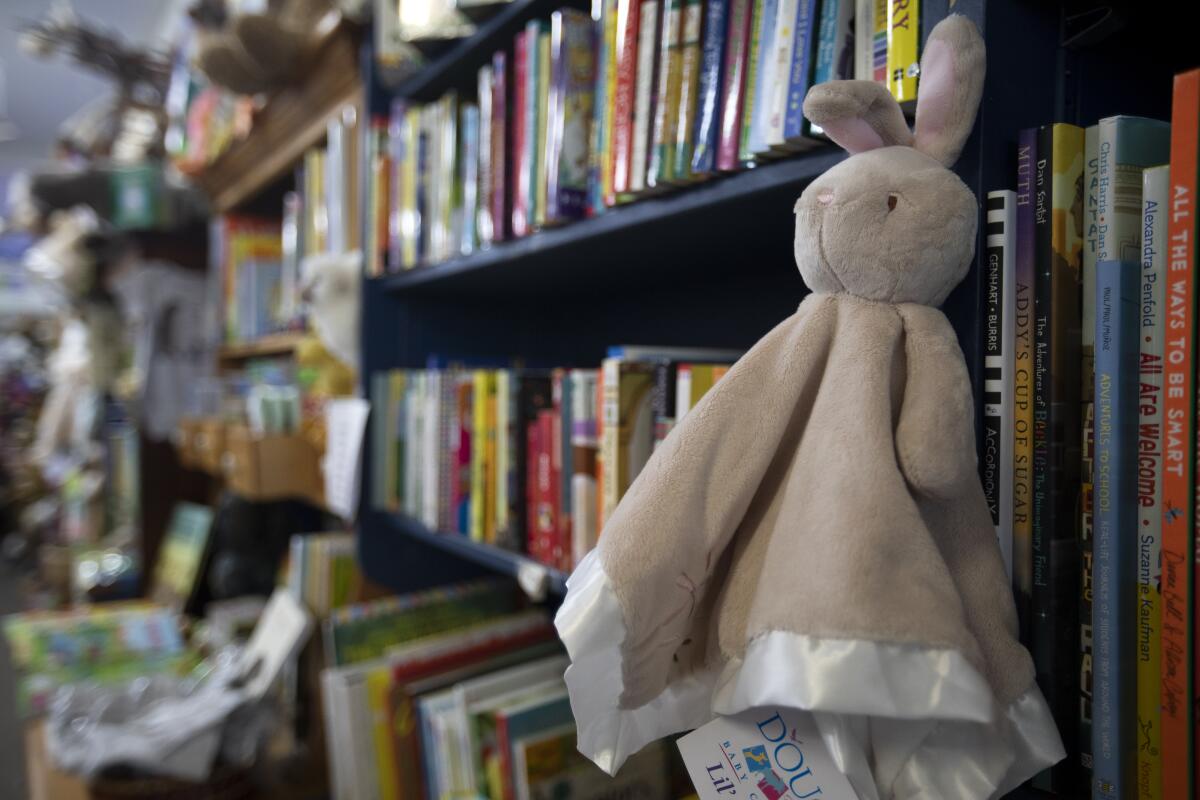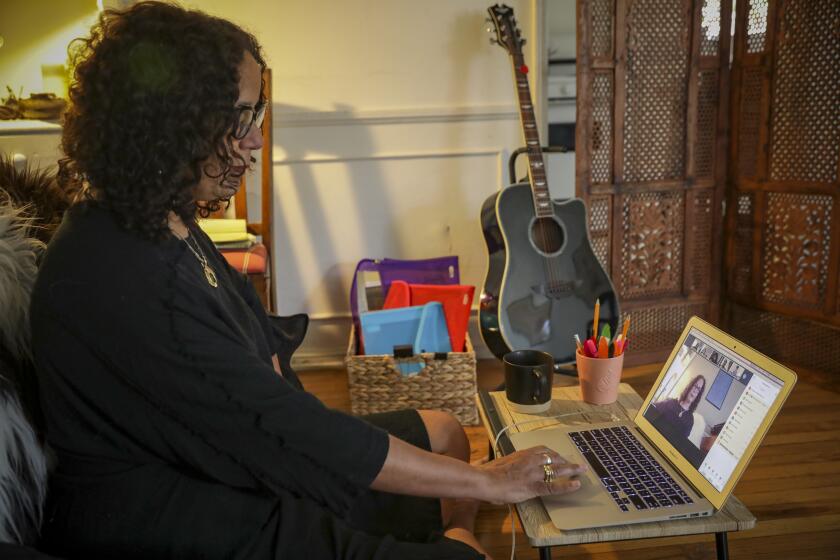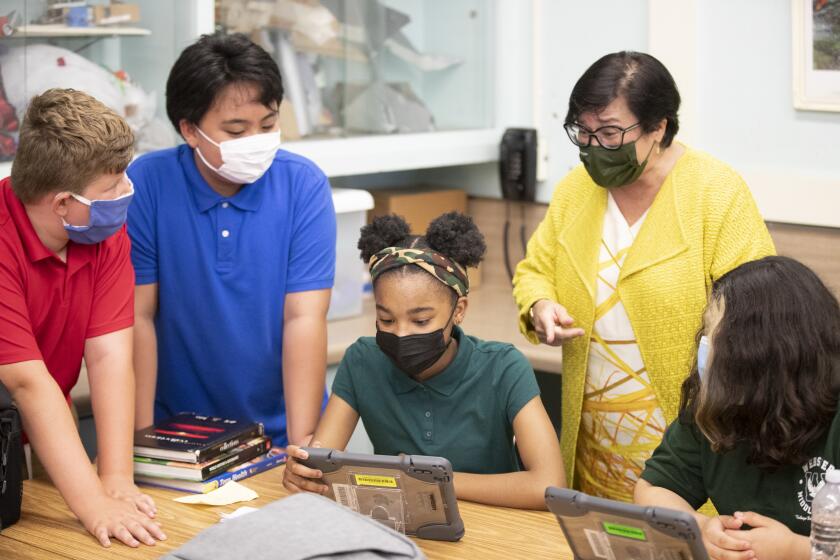Does it really matter if our kids refuse to pick up a book?

- Share via
I remember the magnificent moment I realized my niece could read.
She was 6, and had come for the weekend.
It was bedtime and we were reading “Make Way for Ducklings,” the children’s classic about the mallard couple who waddle around Boston trying to find a safe place to raise their brood. After many adventures, they end up on an island in the Boston Public Garden lagoon.
“Now you try,” I urged.
“I can’t read,” she said.
“Just try.”
She sounded out a few words.
“You’re reading!” I exclaimed.
“But I can’t read,” she insisted.
Two years later she moved in with me. Our bedtimes were filled with stories: “Guess How Much I Love You.” “The Day the Crayons Quit.” “Ramona Quimby, Age 8.” “Madeline.”
Now she is 11 and more interested in TikTok than in 12 little girls in two straight lines who lived in a house that was covered in vines.
And while she certainly can read, she really doesn’t like to.
As someone who comes from a family of educators and writers, this is painful for me. To my regret, reading has become one of our most reliable points of friction. (The other two: sugar consumption and screen time.)
“Just read for 20 minutes a day,” I plead.
“I don’t want to,” she replies.
“You have to,” I say.
“Or what?” she asks.
What I want to say: “Or you will never make it in school! You will never go to college! You will work a minimum-wage job your whole life!”
What I actually say: “Or I will take your iPad away.”
“Well, then,” she replies, “how about if I read on my iPad?”
Touché.
::
“I wouldn’t worry too much,” said educational consultant Lori Ann Waldinger when I called to discuss my distress. As digital natives, our children simply have a different relationship with the written word than those of us who came of age in the typewriter era, suggested Waldinger, who advocates for special-needs kids.
Abcarian: The pandemic made me repeat fourth grade. Trust me, it was the weirdest school year ever
Each weekday morning for 90 minutes, I was an involuntary hostage to my 10-year-old’s distance-learning class. I loved it.
“Kids do lots of incidental reading,” she told me. “They may not love books like ‘The Secret Garden’ or ‘Nancy Drew,’ but our kids aren’t wired that way.”
Playing video games is reading, she said. Watching a movie like “Hamilton” with closed captions is reading. Using a recipe to make cookies is reading.
Ann Steinberg, a veteran educator who retired last year after teaching fifth-grade English at Westminster Elementary School in Venice, urged me to stop fighting over reading.
“The fighting is never going to be any good,” Steinberg said. “You have to suck it up. I know I did.”
As a passionate reader, she was frustrated when her three children needed a lot of encouragement to read.
“I had to let go of my own interest, desires, whatever,” she told me. “My youngest kid wanted to read nothing but ‘Captain Underpants’ when she was in fifth grade. What the heck? Then I thought, ‘For God’s sake, if this is what she wants to read, fine.’ I thought the stuff was so stupid, but she enjoyed it.” (“Captain Underpants,” by Dav Pilkey, is a series of graphic novels replete with goofy characters and so much toilet humor and violence that it has been banned in schools all over the country.)
You just can’t expect kids to sit down and open a volume of the encyclopedia like we did back in the day. Many have probably never even seen one.
“Media and information comes so quickly on the internet, and they are texting all the time,” Steinberg said. “They are used to getting things in compact, quick ways.”
As we navigated a rite of passage, she worried about her new locker. I worried about COVID-19.
Tech-addled adults are not immune to the curse of the shortened attention span. Unless I am deeply engaged in a subject, I no longer have the patience for those overly long New Yorker stories. That teetering pile of unread books on my nightstand could kill me in an earthquake. How did it get so tall? Because I used to read novels until I got sleepy. Now I snuggle with my iPhone.
::
Online (naturally) you can find oceans of information about how important reading is to a child’s developing brain and tips for making reading more attractive (Audio books! Comic books! Book clubs! Encourage them to write their own books!)
In her latest book, “How We Read Now: Strategic Choices for Print, Screen, and Audio,” the linguist Naomi S. Baron cites a British survey in which secondary students said they preferred reading e-books over printed books because books are “boring.”
“Print can tire you out really fast and get boring no matter how interesting the book is,” said one student.
“On paper, there’s just too many words on the page and it’s too long, you get confused,” said another.
“What are students trying to tell us?” asks Baron. She has several hypotheses.
“Print is staid,” she wrote. You can’t really multitask while reading a book the way you can on a screen.
Also, “today’s students subliminally feel that when reading in print, they’re supposed to go more slowly and expend more effort.”
And finally, since teachers often tell students that print and digital are “educationally equivalent … students believe them.” How, she wondered, “can we fault students for making the choice between ‘equals’ that’s ... often more convenient but also perceived as reducing the time and mental energy they need to expend?”
I’ve been so worried about my niece’s aversion to reading that I finally Googled “successful people who don’t read.” There must be many wonderfully accomplished souls who are book-averse, right?
Up popped a 2017 Business Insider story. High on the list of names: Kanye West. “I am a proud non-reader of books,” he told Reuters in 2009. “I like to get information from doing stuff like actually talking to people and living real life.”
Surprising, given that his mother was an English professor for more than 30 years.
But you know what? Kids rebel against their parents.
What better way to carve out your own identity in a house full of readers than to spurn the written word?
More to Read
A cure for the common opinion
Get thought-provoking perspectives with our weekly newsletter.
You may occasionally receive promotional content from the Los Angeles Times.













